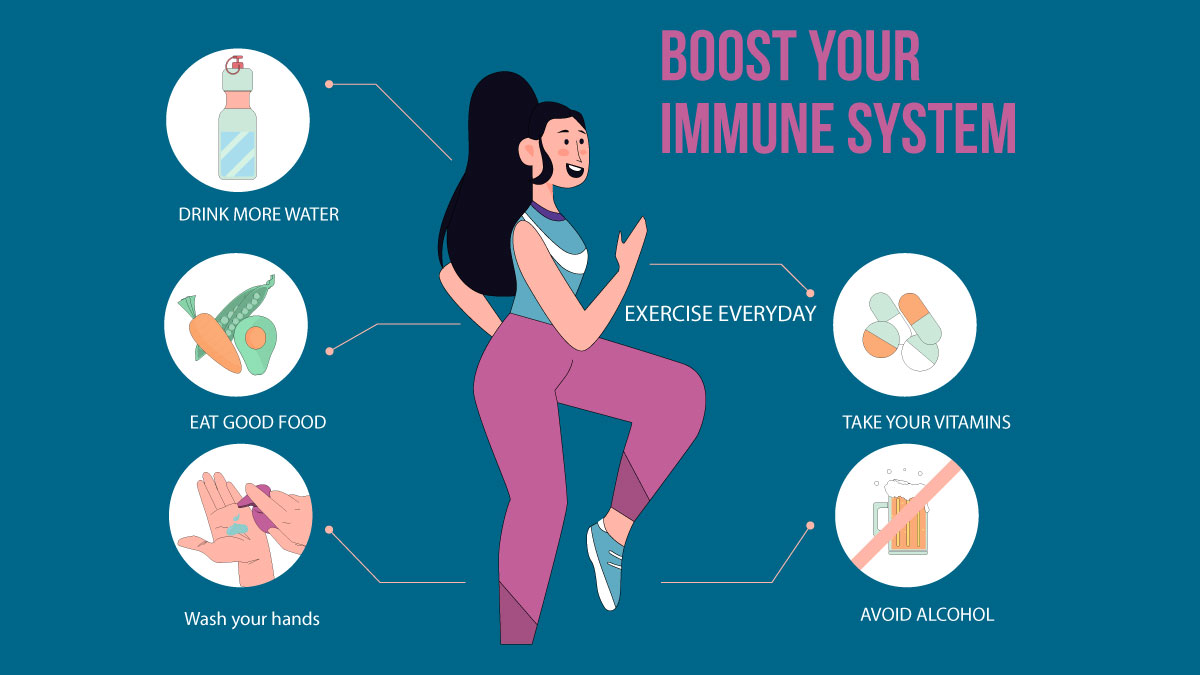Methods for strengthening your immune system and combating illness
What can you do to boost your immune system’s strength? Overall, your immune system does an excellent job of defending you against microorganisms that cause illness. However, sometimes it doesn’t work: a virus infiltrates your body and causes you to get unwell. Is it possible to interfere at this point and improve your immune system? What if you altered the way you ate? Do you use any herbal or vitamin supplements? Making further lifestyle changes in the aim of obtaining a near-perfect immune response?
What are some things you may do to boost your immune system’s strength?
The idea of Strengthening Your Immune System appeals to you, but the ability to do so has proved tough to attain for a number of reasons. The immune system is not a single organism, but rather a collection of interrelated processes. To function correctly, it requires balance and harmony. Experts still don’t fully comprehend the immune system’s intricacies and linkages. At this moment, there are no scientifically proven direct links between a healthy lifestyle and increased immune function.
However, this does not discount the fact that the effects of lifestyle on the immune system are intriguing and need additional investigation. Diet, exercise, age, psychological stress, and other factors are being investigated in both animals and humans to discover how they influence immunological responses. Meanwhile, general healthy-living strategies make sense since they are predicted to increase immune function as well as provide other established health benefits.
How to Make a Healthy Immune System Boost
As your first line of defense, choose a healthy lifestyle. The single most important thing you can do to keep your immune system in excellent working order is to follow fundamental health guidelines. Every component of your body, including your immune system, functions well when it is protected from environmental assaults and reinforced by healthy-living strategies like these:
• Please refrain from smoking.
• Exercise on a regular basis and eat a nutritious diet rich in fruits and vegetables.
• Keep a healthy BMI (body mass index) (BMI).
• Drink alcohol in moderation if you must.
• Make certain you get adequate sleep.
• Prevent illness by washing your hands often and thoroughly preparing meats.
• Make a concerted effort to lower your stress level.
• Vaccines should be updated at least once a year. Vaccines train your immune system to fight illnesses before they can establish a foothold in your body.
Boost your immune system in a healthy way.
Many products on the market claim to boost or boost immunity. Increased immunity, on the other hand, makes little sense from a scientific viewpoint. Increasing the number of cells in your body, whether immune cells or other types, isn’t necessarily a good thing. Stroke is a problem for athletes who utilize “blood doping,” which includes pumping blood into their body to enhance the number of blood cells and boost performance.
It’s exceedingly tough to improve your immune system’s cells since the immune system comprises so many different sorts of cells that respond to infections in so many various ways. Which cells should be improved, and how many should be added? The answer has yet to be discovered by scientists. The fact that the body creates immune cells on a constant basis is well recognized. It produces much more lymphocytes than it can possibly employ, and the extra cells naturally die in a process known as apoptosis, with some dying before seeing any action and others dying after the battle is over. Nobody knows how many cells the immune system needs or what cell mix is optimum for it to function properly.
The immune system and old age
As we become older, our immune system weakens, leading to an increase in infections and cancer. The incidence of age-related illnesses has increased in rich countries as life expectancy has increased.
While some people age gracefully, research has shown that the elderly are more susceptible to infectious diseases and, more importantly, are more likely to die as a result of them than younger people. Infections affecting the lungs, such as influenza, the COVID-19 virus, and pneumonia, are a leading cause of death in those over 65 all over the world. Nobody knows why this happens, however some researchers have seen a correlation between the increased risk and a decrease in T cells, which might be related to the thymus atrophying with age and producing fewer T cells to fight infection. It’s unclear if the decrease in T cells is related to thymus dysfunction or whether other factors are at work. Others want to determine whether the bone marrow loses its ability to produce stem cells, which give rise to immune system cells.
The immunological response of older persons to immunizations has showed a reduction in recent years. Investigations into influenza immunizations, for example, have indicated that the vaccine is less effective in those over 65 than in healthy children (over age 2). Vaccines for influenza and S. pneumonia, despite their low efficacy, have significantly decreased the incidence of sickness and death in older persons when compared to those who have not been immunized.
The immunological response of older persons to immunizations has showed a reduction in recent years. Investigations into influenza immunizations, for example, have indicated that the vaccine is less effective in those over 65 than in healthy children (over age 2). Vaccines for influenza and S. pneumonia, despite their low efficacy, have significantly decreased the incidence of sickness and death in older persons when compared to those who have not been immunized.
There seems to be a relationship between food and immunity in the elderly. Micronutrient deficiency is a kind of malnutrition that is shockingly common, even in developed countries. Micronutrient malnutrition, in which a person is deficient in some critical vitamins and trace minerals obtained from or supplemented by diet, may develop in the elderly. Older people tend to eat less and consume a less diversified diet. One hot subject is whether nutritional supplements might help older people maintain a healthy immune system. This is something that elderly people should discuss with their doctor.
Your diet and your immune system
Like any other war force, the immune system army marches on its stomach. Consistent nourishment is required for healthy immune system warriors. According to specialists, those who are poor and hungry are more susceptible to infectious diseases. Some dietary components, such as processed meals or a high simple sugar intake, may have a deleterious influence on immunological function, according to researchers. The influence of nutrition on the human immune system is presently the subject of a small number of studies.
When tested in the test tube, micronutrient deficiencies such as zinc, selenium, iron, copper, folic acid, and vitamins A, B6, C, and E have been shown to alter immune responses in animals. On the other hand, the effect of these immune system flaws on animal health is less clear, and the influence of similar flaws on human immunological response has yet to be discovered.
So, what alternatives do you have? If your diet isn’t fulfilling all of your micronutrient needs — maybe you don’t like vegetables — taking a daily multivitamin and mineral supplement may provide extra health benefits in addition to any immune system benefits. If you take huge quantities of a single vitamin, it will not function. It is not always the case that more is better.
Immunity-boosting herbs and vitamins?
When you go into a store, you’ll see bottles of pills and herbal mixtures promising to “boost immunity” or otherwise increase the health of your immune system. Although numerous supplements have been proven to impact key components of immune function, there is no evidence that they actually improve immunity to the point where you are better protected against infection and sickness. It’s still tough to prove whether or not a herb — or any medicine, for that matter — can increase immunity. Scientists, for example, are dubious whether an herb that seems to boost antibody levels in the blood is genuinely beneficial to general immunity.
Stress and immune function
Modern medicine has acknowledged the relevance of the mind-body relationship. Emotional stress has been linked to a variety of health problems, including stomach pain, rashes, and even heart disease. Despite the challenges, scientists are continuing to investigate the relationship between stress and immune function.
To begin with, stress is a difficult notion to define. What seems to be a stressful situation to one person may not be so to another. Individuals find it difficult to measure how much stress they feel when they are subjected to stressful situations, and scientists find it challenging to evaluate whether a person’s subjective estimate of stress is accurate. The scientist can only assess factors that may indicate stress, such as the number of times the heart beats each minute, but such readings could also indicate other reasons.
Most scientists investigating the link between stress and immunological function, on the other hand, are interested in chronic stress, which includes stress caused by relationships with family, friends, and colleagues, as well as persistent pressures to do well at one’s job. Chronic stress may have an effect on the immune system, according to some studies.
It is, however, impossible to conduct “controlled tests” on people, as scientists refer to them. A scientist can change only one variable in a controlled experiment, such as the amount of a specific chemical, and then measure the effect of that change on another measurable phenomenon, such as the amount of antibodies produced by a specific type of immune system cell when exposed to the chemical. Because there are so many other things going on in the animal’s or person’s life at the time measurements are taken, that type of control is just not imaginable in a live animal, much alone a human being.
Despite the inevitability of hurdles, scientists are making progress in determining the link between stress and immunity.
Is it true that a cold lowers your immune system’s strength?
Almost every mother has counseled, “Wear a jacket or you’ll get a cold!” Is she right? No, being exposed to moderately cold weather does not increase your risk of becoming sick. For two reasons, winter is characterized as “cold and flu season.” In the winter, people spend more time inside, bringing them in closer contact with others who may transmit their diseases. When the air is cold and dry, the influenza virus may last longer in the air.
However, scholars in many societies continue to be intrigued by this topic. According to multiple research, cold exposure reduces the ability of mice to fight illness. But what about the people? Participants were plunged in cold water for a brief period of time or kept naked in subzero temperatures for short periods of time in experiments done by scientists. They’ve looked at those who have lived in Antarctica and others who have gone on excursions in the Canadian Rockies. The results have been a bit of a mishmash. Researchers identified a rise in upper respiratory infections among elite cross-country skiers who train hard in the cold, but it’s unclear whether the illnesses are caused by the cold or other factors such as intense exertion or dry air.
After studying hundreds of medical journals and doing their own research, a group of Canadian specialists came to the conclusion that moderate cold exposure has no harmful influence on the human immune system. Should you bundle up when it’s cold outside? The answer is “yes” if you’re uncomfortable or if you’ll be outdoors for an extended period of time when frostbite and hypothermia are a danger. Immunity, on the other hand, isn’t anything to be worried about.
Is it true that exercise boosts immunity?
Regular exercise is one of the pillars of a healthy lifestyle. It improves cardiovascular health, lowers blood pressure, promotes weight loss, and protects against a variety of diseases. Is it, on the other hand, beneficial in naturally increasing and preserving the health of your immune system? Exercise, like a well-balanced diet, may contribute to general health and, as a consequence, a strong immune system.




